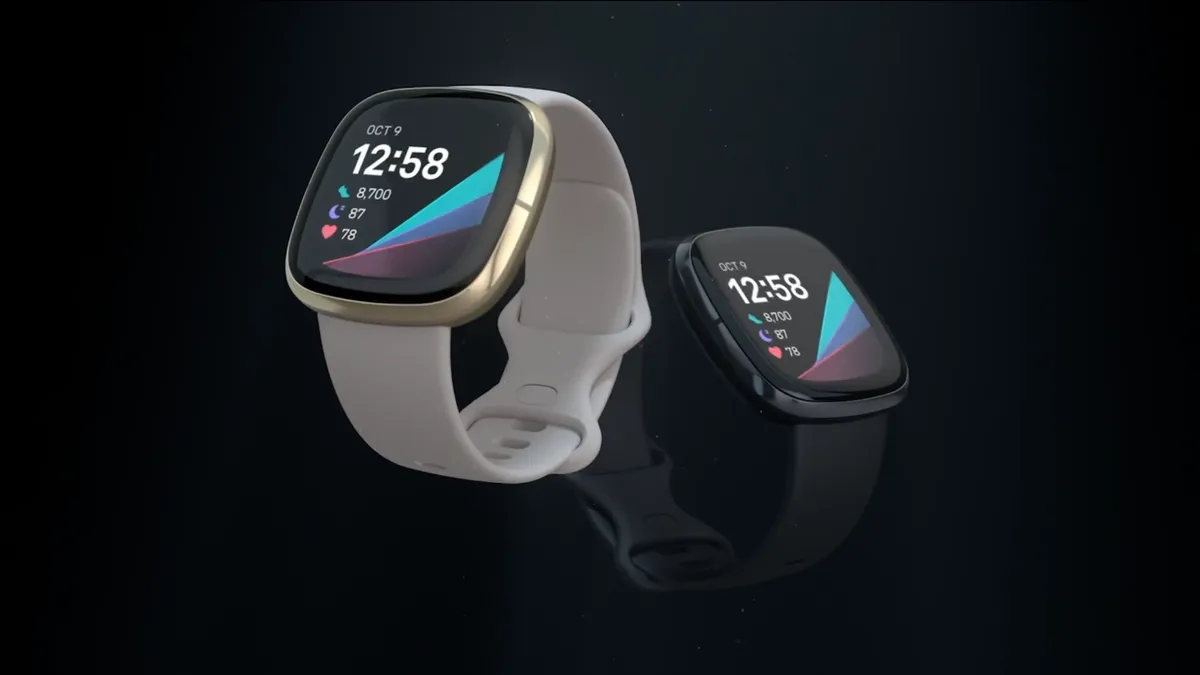Dive Brief:
- Fitbit has launched a new smartwatch with several features touting stress relief and illness detection, even as the wearables manufacturer waits on FDA's OK for a key health feature.
- The Fitbit Sense, which includes a skin temperature sensor and a heart rate tracker, comes as wearables are being trialed as early warning devices for COVID-19.
- The electrocardiogram app is currently undergoing regulatory reviews in the U.S. and European Union, and will only be available pending clearance, a spokesperson said, while declining to comment on the authorization timeline.
Dive Insight:
Fitbit's goal with the new watch, which will cost $329.95, is to track data like electrodermal activity, a signal of stress, along with breathing rate, blood-oxygen level and heart rate variability with an electrocardiogram as the company pivots to a stronger focus on health management.
The new products represent a "transition from fitness tracking to becoming an essential platform putting you in control of your health," CEO James Park said at a pre-recorded virtual launch on Monday. Google is currently seeking to acquire Fitbit for $2.1 billion.
Adding an EKG feature would bring Fitbit up to speed with Apple and Samsung's smartwatches, which already include the capability. Apple's devices have included heart rate detection since 2018.
Irregular heart rhythms, or arrhythmias, can signal serious health conditions. The goal of the devices is to catch arrhythmias as early as possible, so the user can flag the symptom for their physician. However, studies have shown noted limitations around the devices' efficacy in tracking heart rhythm, and experts in the field have argued any abnormalities flagged by smartwatches shouldn't be accepted as a diagnosis over concerns false positives could lead to unnecessary medical interventions.
Renderings of the Sense, along with newest iteration of its Versa line, leaked earlier this month. But Fitbit announced it was working on the EKG feature in May, with a massive study to assess whether its sensors can pinpoint irregular heart rhythms that could indicate atrial fibrillation, a significant risk factor for stroke.
But getting that coveted FDA greenlight for an EKG is another matter. Fitbit worked for years to get the regulatory OK for its blood-oxygen level, or SpO2, tracking features.
Still, the San Francisco-based wearables maker is a member of FDA's software precertification, or Pre-Cert, program, which aims to speed digital health products to market, along with Apple, Johnson & Johnson and other major names in the space.
Wearables manufacturers are also testing the efficacy of their popular devices for early disease detection, as consumer interest in at-home health management grows. Though wearables shipments have dropped in 2020 as consumers pare down non-essential purchases, Fitbit may be angling to take advantage of interest in early warning signs of COVID-19 and other diseases.
Fitbit began studying the efficacy of its sensors for COVID-19 detection in May. Though the results of the study have yet to be published in a peer-reviewed journal, a preprint released Wednesday found Fitbit devices detected almost 50% of COVID-19 cases one day before participants noted symptoms.
A key metric was heart rate variability, which Fitbit's data suggests decreases in patients positive for COVID-19, while resting heart rate and breathing are commonly elevated.














